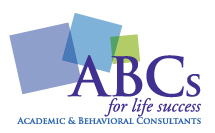Advocacy
Understanding educational rights and navigating the complex procedures for securing appropriate educational placement and services can seem daunting for parents of children with special needs. At ABCs for Life Success, we
- Assist parents in navigating the school system procedures to secure school services and placement for children with unique special needs.
- Act as a liaison in meetings between parents and school personnel.
- Monitor legal issues, help parents understand their rights, and provide appropriate interventions when rights are violated.
- Assist with due process hearings.
Under federal law, all children are entitled to a free appropriate public education (FAPE). In the case of many children with special needs, exactly what is "appropriate" is often difficult to define and provide. To help make this determination, ABCs for Life Success will help you address the five major components of FAPE (the 5 Ps).
Major Components of a Free Appropriate Public Education (the 5 P's)
Parents. Parent participation is essential. Parents should be active and equal partners in the process to evaluate, identify, and educate children with special needs.
Plan. A legally enforceable individual education plan (IEP) or 504 plan documents specific disabilities, required accommodations and progress, and outlines specific educational plans and goals.
Progress. The child must make meaningful and significant progress in both the curriculum (as defined by the state curriculum or non-public school) and in the goals set out by the Plan.
Placement. A child must have a school placement in either the special education or general education setting that provides for all of his or her needs. The placement must be clearly defined for all services, and how those services will be provided.
Procedures. The school system must follow procedures set out by IDEA and State law. This includes paperwork, notifications, and all procedures related to each stage of the special education process.
Source: Special Needs Advocacy Resource Book: What You Can Do Now to Advocate for Your Exceptional Child's Education. Prufrock Press, 2008








